Demolition Contractors Wilkes-Barre
Find Demolition Services in Wilkes-Barre
Get multiple Demolition Experts quotes for your project today! Compare profiles, reviews, accreditations, portfolio, etc... and choose the best offer.
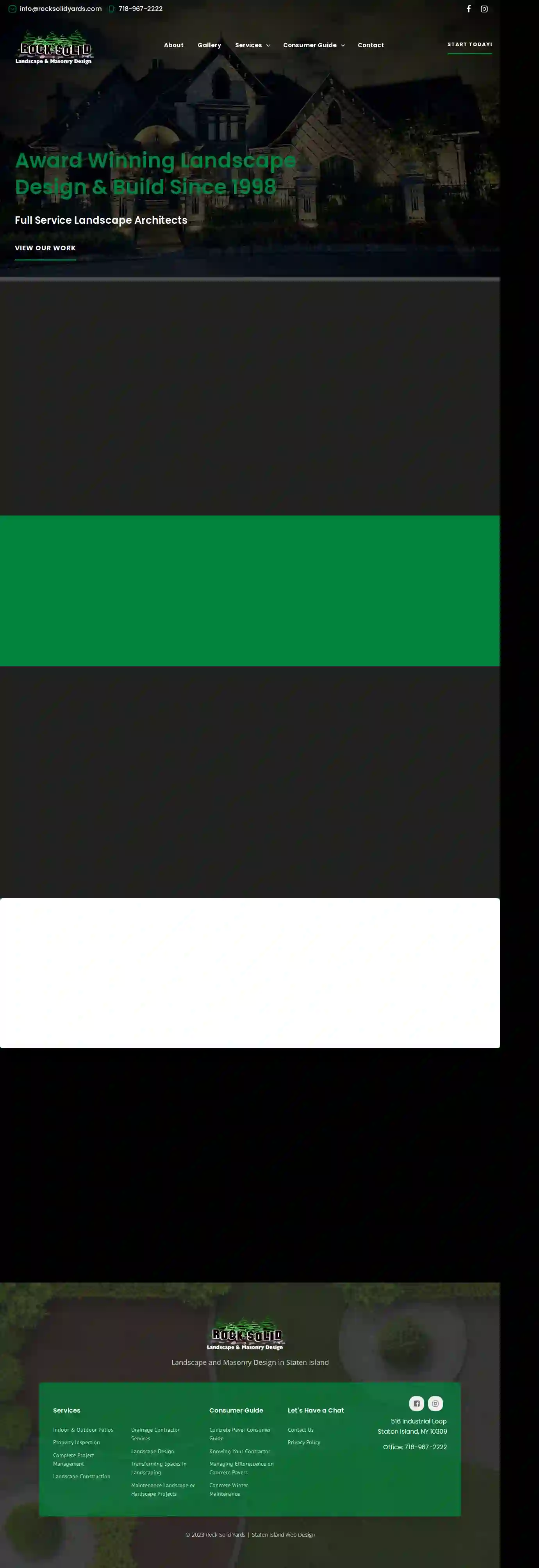
Rock Solid Landscaping and Masonry Design, Inc
3.723 reviews516 Industrial Loop, Staten Island, 10309, USAward winning landscape design & build since 1998 Full Service Landscape Architects Award winning landscape design & build since 1998 Full Service Landscape Architects Award winning landscape design & build since 1998 Full Service Landscape Architects Rock Solid Landscape and Masonry Design Inc specializes in designing and creating your dream home. Being experts in both hardscape and landscape design in Staten Island, we will help build the concept from your vision and ideas, and bring them to life. From start to finish, we work together with each of our clients to ensure that the work that is being done matches the concept that they dreamed up. Let Rock Solid Landscape and Masonry Design Inc create your next landscape masterpiece. Rock Solid Yards is the winner of Two 2010 Staten Island Chamber of Commerce Building Awards for: ROCK SOLID LANDSCAPE AND MASONRY DESIGN INC. more about us Serving the Tri-State area since 1998. MICHAEL IZZO OWNER/MASTER DESIGNER Michael Izzo has over 20 years of Landscape and Masonry Construction experience. He built Rock Solid Landscape and Masonry Design, Inc. from the ground up and he attributes his success to practicing good old fashioned business ethics and promoting a company philosophy of “exceeding customer expectations”. “Customers will return to and promote a business that consistently shows up and delivers exceptional quality projects on schedule and on budget. It’s really that simple.” Trust us for your masonry design and landscaping in Staten Island
- Services
- Why Us?
- Our Team
- Testimonials
- Gallery
Get Quote
CAG Construction Corporation
1540 Castleton Ave., Staten Island, USCAG CONSTRUCTION CORP. CONSTRUCTION DONE RIGHT Our experience ensures that your projects will be completed within budget, on time and with the upmost professionalism. LEARN MORE Family Run and Operated Construction Company Since 2007
- Services
- Why Us?
- Gallery
Get Quote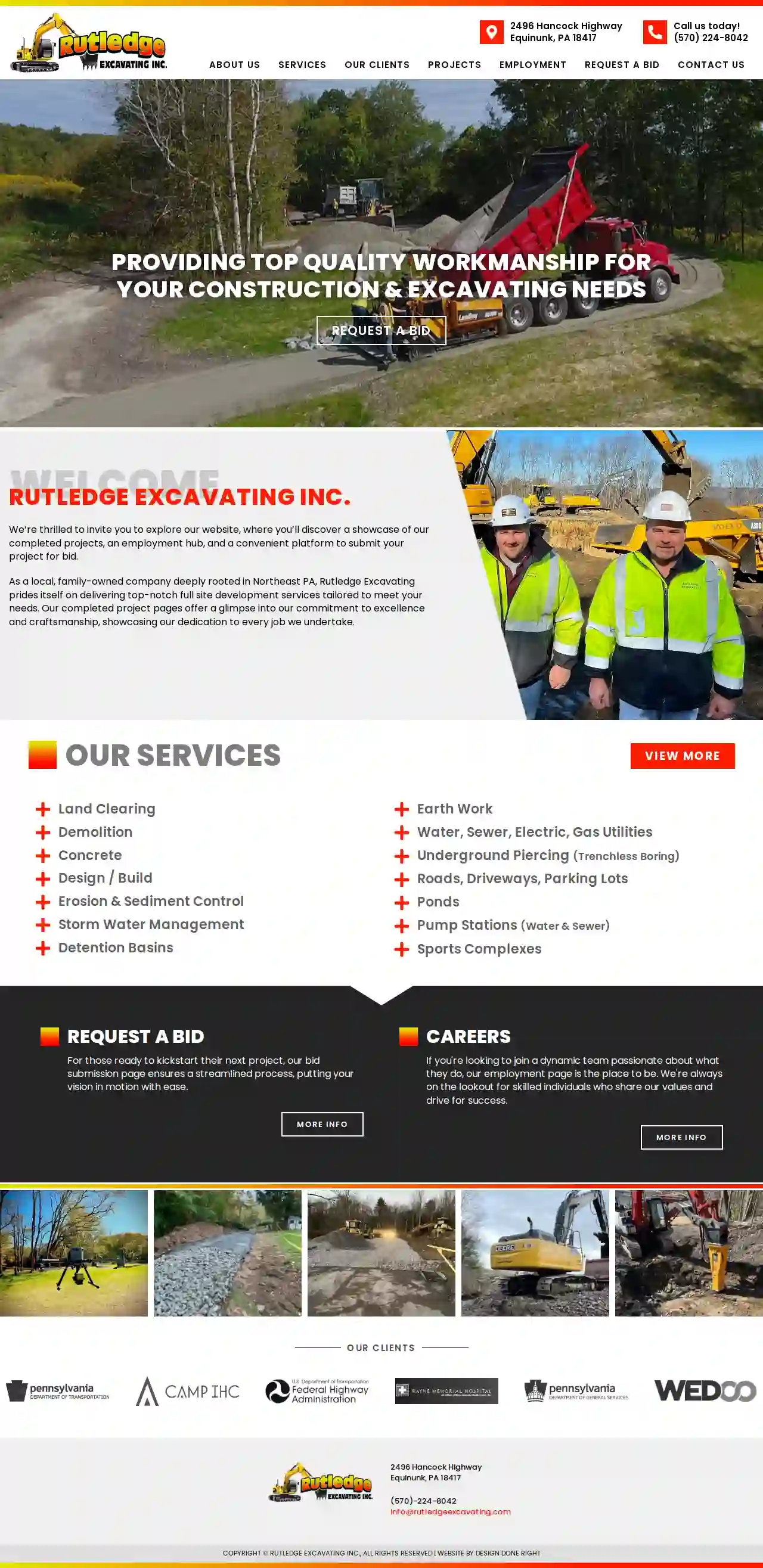
Rutledge Excavating Inc.
3.56 reviews2496 Hancock Highway, Equinunk, 18417, USWELCOME RUTLEDGE EXCAVATING INC. We’re thrilled to invite you to explore our website, where you’ll discover a showcase of our completed projects, an employment hub, and a convenient platform to submit your project for bid. As a local, family-owned company deeply rooted in Northeast PA, Rutledge Excavating prides itself on delivering top-notch full site development services tailored to meet your needs. Our completed project pages offer a glimpse into our commitment to excellence and craftsmanship, showcasing our dedication to every job we undertake. OUR SERVICES View More Land Clearing Demolition Concrete Design / Build Erosion & Sediment Control Storm Water Management Detention Basins Earth Work Water, Sewer, Electric, Gas Utilities Underground Piercing (Trenchless Boring) Roads, Driveways, Parking Lots Ponds Pump Stations (Water & Sewer) Sports Complexes REQUEST A BID For those ready to kickstart their next project, our bid submission page ensures a streamlined process, putting your vision in motion with ease. MORE INFO CAREERS If you're looking to join a dynamic team passionate about what they do, our employment page is the place to be. We're always on the lookout for skilled individuals who share our values and drive for success. MORE INFO
- Services
- Why Us?
- Gallery
Get Quote
Tribar Services Inc
54 reviews950 Route 36, Suite 101, Leonardo, 07737, USAbout Tribar Services Family owned and operated since 1995, we pride ourselves on maintaining deep ties to our community, while delivering a lasting and sustainable (literal) foundation for our clients. Based in Monmouth County and operating throughout the Mid-Atlantic, including Connecticut, we offer a wide range of services, performed by a staff of highly qualified and seasoned professionals. Such services include all aspects of Demolition, Foundation Repair & Construction, Full Service House Lifting, House Elevation, & House Raising, along with Concrete Masonry, Flatwork, & Hardscaping and including Rigging, Heavy Lifting, and Emergency Salvage related services. Our Core Values: We are a full service demolition company bringing the highest quality workmanship using the most cost effective means. Uniqueness: We tackle difficult projects with innovative solutions and creative strategies looking at each project with the philosophy of reduce, reuse and recycle. Service: Our staff of professionals are seasoned with diverse qualifications and backgrounds and the ability to give our clients the personal attention only a small company can provide. Including a full time NYC permit expediter. Integrity: A practice we apply to every project and expect from every employee to achieve the highest standards of professionalism and safety. We are fully licensed by the state of NJ, our license number is 13HE00003400. For information on your Demolition, House Raising, Boat Salvage & Recovery, Foundation Repair or Rigging project, contact the experts at Tribar Services, Inc. Contact us through our website by clicking here, or call us at 732-291-3464.
- Services
- Why Us?
- Our Team
- Testimonials
- Gallery
Get Quote
Perfect Estimator LLC
510 reviews920 HYLAN BLVD, STATEN ISLAND, NEW YORK, 920 HYLAN BLVD STATEN ISLAND, NEW YORK 10305, Staten Island, 10305, USACHIEVE YOUR BIDDING SUCCESS Experience the Power of High-Value Estimating Services Share Gain access to valuable insights and knowledge, empowering you to make informed decisions and win bids confidently. Automate Utilize cutting-edge technology to automate the estimating process, saving time and ensuring accuracy, so you can focus more on your business development. Win Achieve your goal of winning more bids with high-value, accurate estimates, gaining a competitive edge needed to drive your profit gains and business growth. Reliable Estimating and Takeoff Solutions For over a decade and a half, Perfect Estimator LLC has been a beacon of trust in the construction domain, delivering premium quantity take-off and cost estimation services to contractors across the USA, UK, and Australia. Our proficient team of construction estimators has garnered acclaim for their swift and accurate material estimates, tailored to meet the needs of diverse construction trades. Our array of services encompasses precise estimation for residential, commercial, and industrial ventures, meticulously aligned with the standards set by esteemed bodies like the American Estimators Organization and the American Association of Cost Engineers (AACE). At Perfect Estimator LLC, we prioritize adherence to industry guidelines to ensure the utmost accuracy in our estimates. Backed by seasoned construction managers and adept quantity surveyors, Perfect Estimator LLC excels in delivering comprehensive material takeoffs. Leveraging a suite of industry-standard tools and software such as Planswift, Bluebeam, and Trimble, our team guarantees precise estimates that meet the rigorous demands of our clientele. Proficiency in tools and software is integral to our operations at Perfect Estimator LLC. From Planswift to Xactimate, our expertise extends to FastPIPE, FastDUCT, and more, enabling us to deliver accurate estimates efficiently. Additionally, our utilization of RS Means, Craftsmen, and proprietary databases for zip-code-based pricing underscores our commitment to excellence. This proficiency, coupled with our reputation for credibility and affordability, positions Perfect Estimator LLC as a leading provider of construction estimating services.
- Services
- Why Us?
- Gallery
Get Quote
Winola Excavating
57 reviews64 Benson Hollow Ln, Tunkhannock, 18657, USWinola Excavating – Delivering quality service and expert craftsmanship for all your construction and excavation needs. We are a full-service local contractor specializing in residential, commercial and industrial excavation and construction services. Our clients include homeowners, business owners, landlords, real estate agents, builders, contractors and developers. What sets us apart? Typically, we are able to provide same day estimates and will show up on time prepared to deliver exceptional service to you. In fact, we have limited to no rescheduling (dependant on weather), price our jobs fairly and get them done in a timely fashion. Your satisfaction is our number one goal. And with 10 years of customer service management experience, we know how to deliver.
- Services
- Why Us?
- Gallery
Get Quote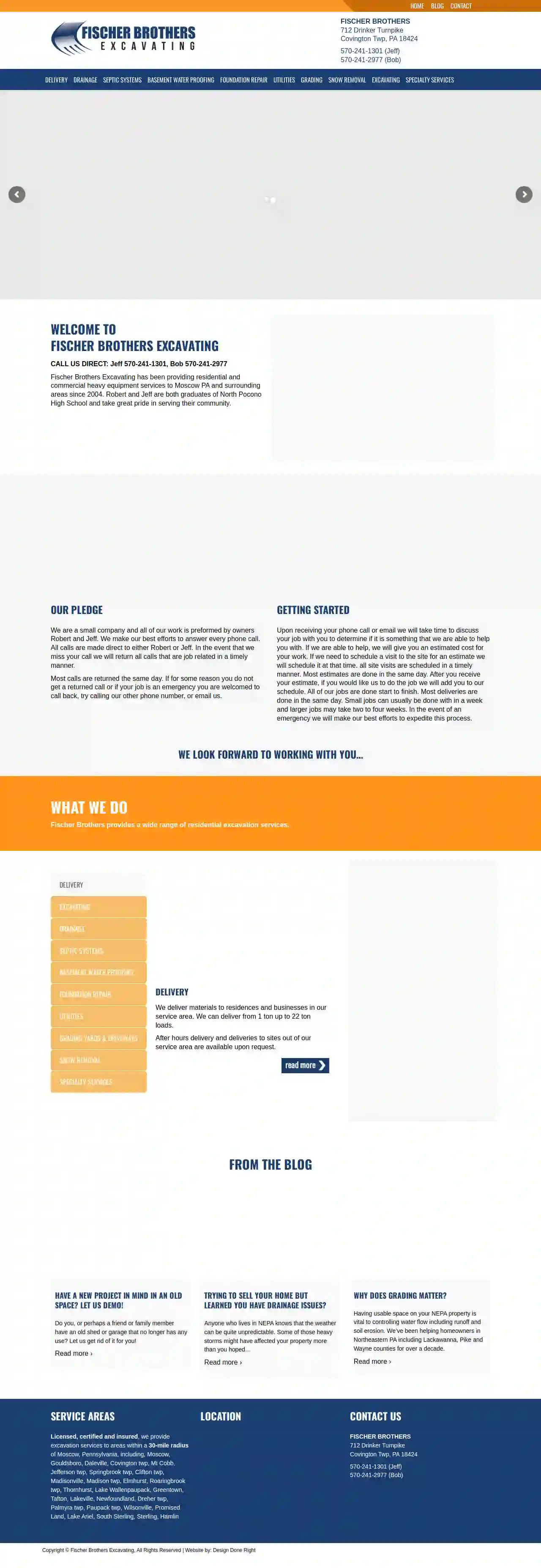
Fischer Brothers Excavating
519 reviews712 Drinker Turnpike, Covington Twp, 18424, USWelcome to Fischer Brothers Excavating, a small company providing residential and commercial heavy equipment services to Moscow PA and surrounding areas since 2004. Robert and Jeff, both graduates of North Pocono High School, take great pride in serving their community. We are a family-owned business, and all of our work is performed by owners Robert and Jeff. We make our best efforts to answer every phone call, and most calls are returned the same day. If you have a job that requires excavation services, we will take the time to discuss your project with you to determine if we are able to help. If we are able to help, we will give you an estimated cost for your work. We offer a wide range of services, including delivery, excavating, drainage, septic systems, basement water proofing, foundation repair, utilities, grading, snow removal, and specialty services. We are licensed, certified, and insured, and we provide excavation services to areas within a 30-mile radius of Moscow, Pennsylvania.
- Services
- Why Us?
- Our Team
- Gallery
Get Quote
CAG Construction Corp.
30 Summit Ave., Staten Island, 10306, USCAG Construction: Your Trusted Partner for Concrete Construction and Site Work CAG Construction is a family-run business established in 2007, specializing in all phases of concrete construction and site work. We are committed to delivering projects within budget, on time, and with the utmost professionalism. Our team has the experience and expertise to work seamlessly with project managers and design teams, ensuring a smooth construction process. Our Commitment to Excellence Edward Gonzalez, our founder, is a graduate of the NYC Small Business Services Construction Mentorship Program, NYC SBS Bond Readiness Program, and the New York City Economic Development Corporation – Construct NYC Program. This comprehensive training has equipped us with the knowledge and skills to deliver exceptional results. Certifications and Accreditations We are proud to be a New York City MBE Certified company, demonstrating our commitment to diversity and inclusion. We are also SCA Approved and a member of the National Association of Minority Contractors (NAMC), further solidifying our dedication to industry standards and ethical practices.
- Services
- Why Us?
- Gallery
Get Quote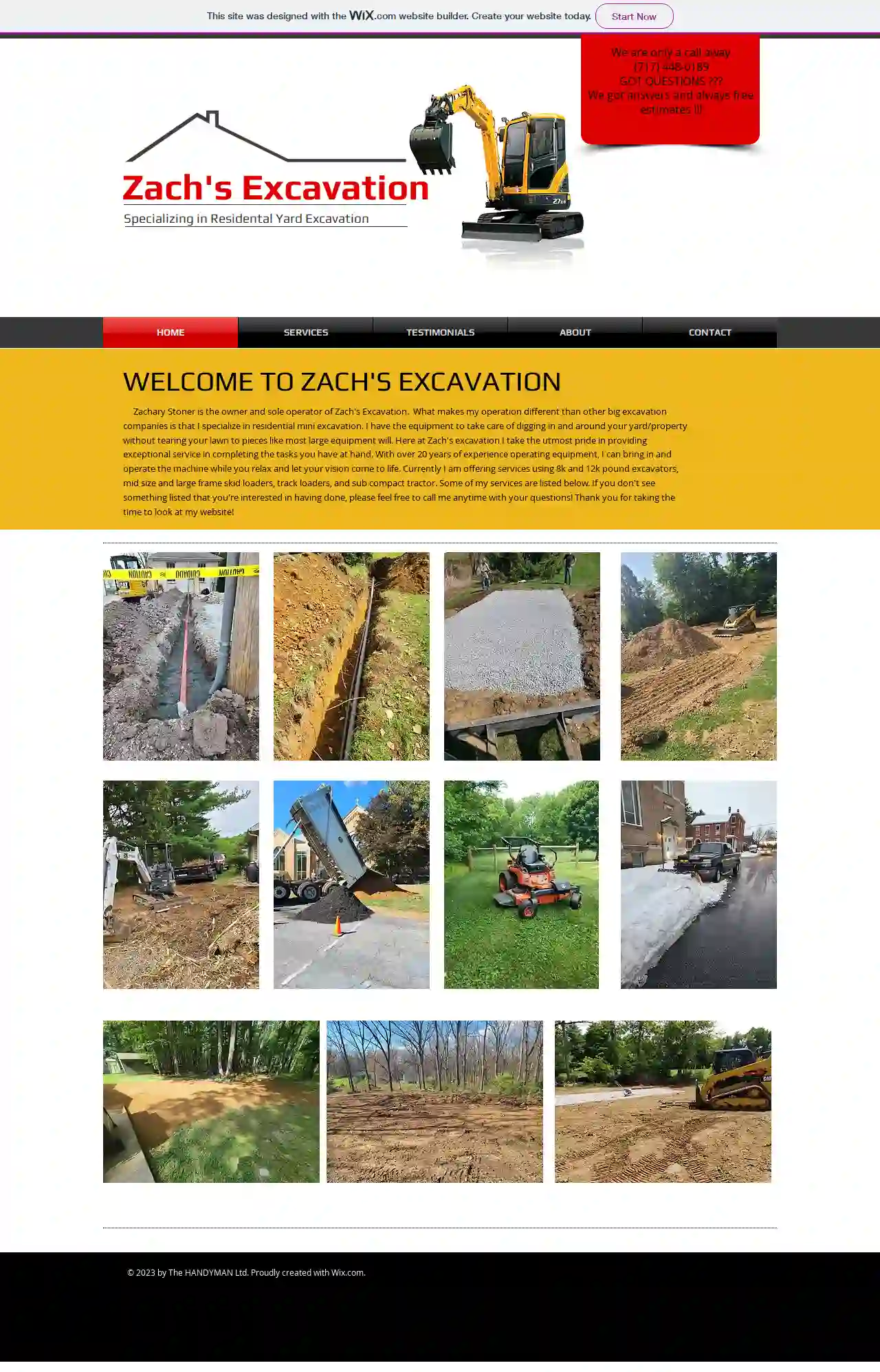
Zach's Excavation
56 reviewsHarrisburg, USZach's Excavation Zachary Stoner is the owner and sole operator of Zach's Excavation. What sets my operation apart from larger excavation companies is my specialization in residential mini excavation. I have the equipment to handle digging in and around your yard/property without causing extensive damage to your lawn, unlike most heavy equipment. At Zach's Excavation, I take immense pride in delivering exceptional service and completing your projects to the highest standards. With over 20 years of experience operating equipment, I can bring in and operate the machine while you relax and watch your vision come to life. Currently, I offer services using 8k and 12k pound excavators, mid-size and large frame skid loaders, track loaders, and sub-compact tractors. Some of my services are listed below. If you don't see a service you're interested in, please don't hesitate to call me anytime with your questions! Thank you for taking the time to visit my website!
- Services
- Why Us?
- Gallery
Get Quote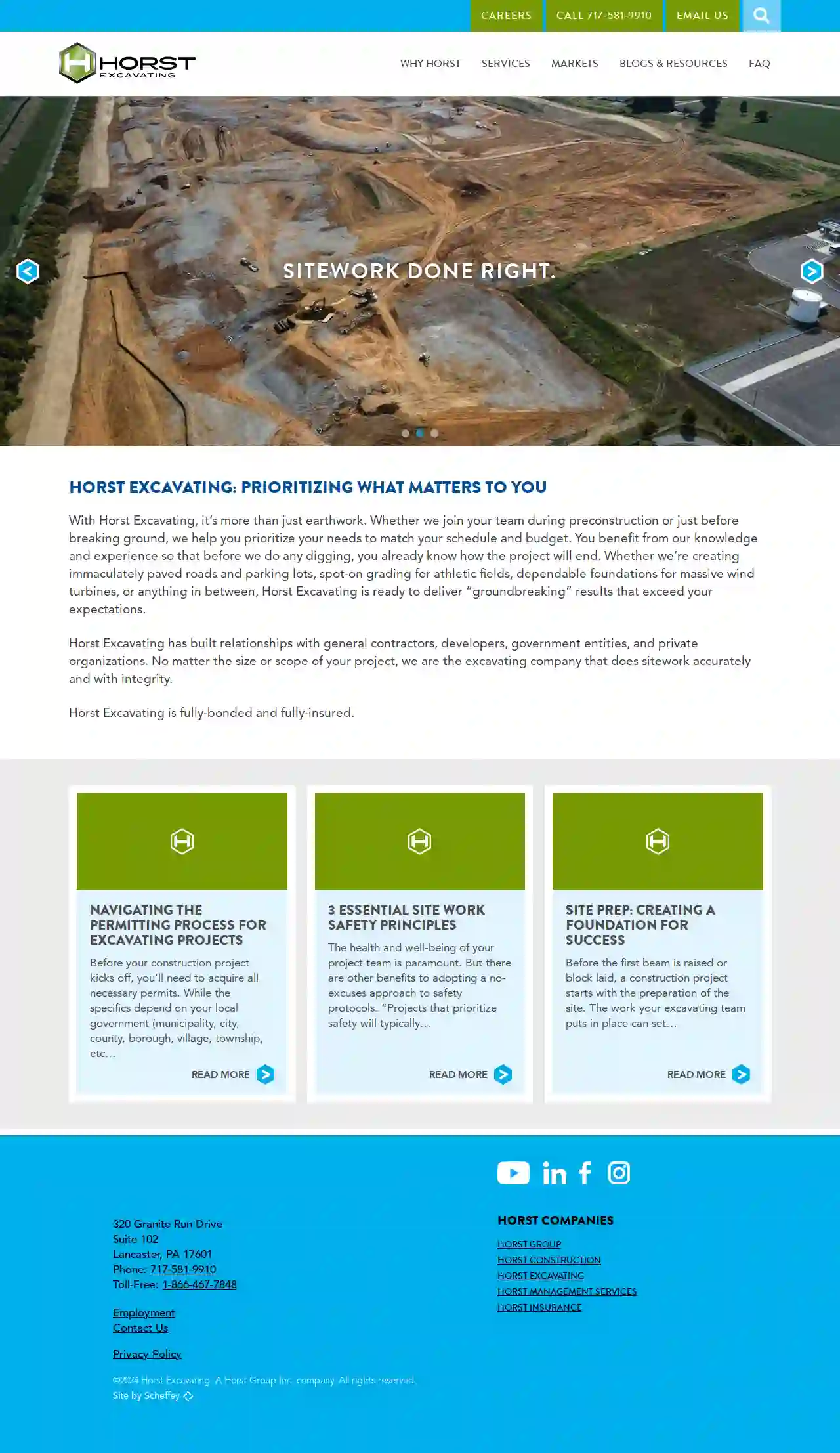
Horst Excavating
416 reviews320 Granite Run Drive, Suite 102, Lancaster, 17601, USHorst Excavating: Prioritizing What Matters To You With Horst Excavating, it’s more than just earthwork. Whether we join your team during preconstruction or just before breaking ground, we help you prioritize your needs to match your schedule and budget. You benefit from our knowledge and experience so that before we do any digging, you already know how the project will end. Whether we’re creating immaculately paved roads and parking lots, spot-on grading for athletic fields, dependable foundations for massive wind turbines, or anything in between, Horst Excavating is ready to deliver “groundbreaking” results that exceed your expectations. Horst Excavating has built relationships with general contractors, developers, government entities, and private organizations. No matter the size or scope of your project, we are the excavating company that does sitework accurately and with integrity. Horst Excavating is fully-bonded and fully-insured.
- Services
- Why Us?
- Gallery
Get Quote
Over 22,076+ Excavation Companies on our platform
Our excavation providers operate in Wilkes-Barre & surrounding areas!
ExcavationHQ has curated and vetted Top Excavation Pros in Wilkes-Barre. Find a top & reliable business today.
Frequently Asked Questions About Demolition Contractors
- Experience: Look for companies with a proven track record and years of experience in the demolition industry.
- Licensing and Insurance: Ensure the contractor is properly licensed to operate in your area and carries adequate insurance to protect you from liability.
- Safety Record: Inquire about their safety protocols and accident history. A reputable contractor prioritizes safety.
- References and Reviews: Ask for references from past clients and check online reviews to gauge their reputation and customer satisfaction.
- Professionalism: Choose a company that communicates clearly, provides detailed estimates, and has a courteous and responsive team.
- 'Can I see proof of your licensing and insurance?' Verify their credentials and coverage.
- 'What experience do you have with projects like mine?' Ensure they have relevant expertise.
- 'Can you provide references from past clients?' Check their reputation and customer satisfaction.
- 'What are your safety protocols?' Prioritize contractors who emphasize safety.
- 'How will you handle hazardous materials?' Ensure they have proper procedures for asbestos or lead abatement.
- 'What is your timeline for completing the project?' Understand the project duration.
- 'How will you manage noise, dust, and debris?' Discuss mitigation measures for minimizing disruption.
- 'What are your payment terms?' Clarify payment schedules and any required deposits.
How do I find a reputable demolition contractor?
What is the difference between demolition and deconstruction?
Demolition: Typically involves bringing down a structure quickly and efficiently, often using heavy machinery and potentially explosives. The primary goal is to clear the site.
Deconstruction: Focuses on carefully dismantling a building piece by piece to salvage reusable materials. It prioritizes minimizing waste and environmental impact, often involving manual labor and specialized tools.
The choice between demolition and deconstruction depends on the project's objectives, budget, and environmental considerations.
What is asbestos abatement?
What questions should I ask a demolition contractor before hiring them?
How do I find a reputable demolition contractor?
- Experience: Look for companies with a proven track record and years of experience in the demolition industry.
- Licensing and Insurance: Ensure the contractor is properly licensed to operate in your area and carries adequate insurance to protect you from liability.
- Safety Record: Inquire about their safety protocols and accident history. A reputable contractor prioritizes safety.
- References and Reviews: Ask for references from past clients and check online reviews to gauge their reputation and customer satisfaction.
- Professionalism: Choose a company that communicates clearly, provides detailed estimates, and has a courteous and responsive team.
What is the difference between demolition and deconstruction?
Demolition: Typically involves bringing down a structure quickly and efficiently, often using heavy machinery and potentially explosives. The primary goal is to clear the site.
Deconstruction: Focuses on carefully dismantling a building piece by piece to salvage reusable materials. It prioritizes minimizing waste and environmental impact, often involving manual labor and specialized tools.
The choice between demolition and deconstruction depends on the project's objectives, budget, and environmental considerations.
What is asbestos abatement?
What questions should I ask a demolition contractor before hiring them?
- 'Can I see proof of your licensing and insurance?' Verify their credentials and coverage.
- 'What experience do you have with projects like mine?' Ensure they have relevant expertise.
- 'Can you provide references from past clients?' Check their reputation and customer satisfaction.
- 'What are your safety protocols?' Prioritize contractors who emphasize safety.
- 'How will you handle hazardous materials?' Ensure they have proper procedures for asbestos or lead abatement.
- 'What is your timeline for completing the project?' Understand the project duration.
- 'How will you manage noise, dust, and debris?' Discuss mitigation measures for minimizing disruption.
- 'What are your payment terms?' Clarify payment schedules and any required deposits.